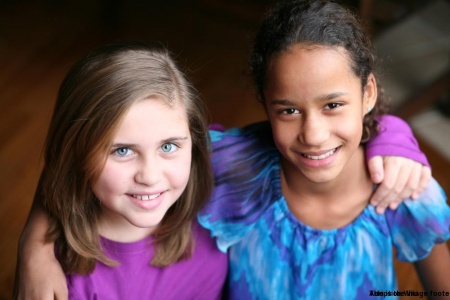Adoption Parenting: Preteen
This information was taken directly from Child Welfare Information Gateway
Psychological Identification
If your child has had several homes before yours, there is often a brief honeymoon period where s/he will try to be perfect to ensure your love. But soon the sense of loss, hurt, and anger surfaces. Your child may, consciously or not, break your rules, steal, lie, or act out physically or sexually. The child's message is "I'm going to leave here anyway, so I'd better make sure I don't get too close" or "Families don't last, and I'm angry about that."
You will need to help your children build trust and gain confidence that you will not abandon them. Part of that job is helping your children to develop the psychological identification that distinguishes them as individuals.
What is this identification process that is so critical to success and confidence in later life? It takes us back to the initial attachment process, when it is important for babies to make an emotional connection that shape their personalities and make them someone who is a unique individual as well as a member of a particular family.
During the elementary school-age years, children's identity comes from a combination of their genetic heritage, their experience with their families, and what happens to them as they try to find their place in the wider world. They want to be like their peers and their families.
The creation of a family tree, a common elementary school assignment which asks children to construct a portrait of their geographical, ethnic, historical, and birth connections, offers an opportunity and a challenge to the adoptive family. This assignment will bring to the surface knowledge and ignorance about your child's background and legitimize discussion of family facts and secrets.
If there has been openness about adoption and a sensitivity to not insisting on discussing adoption when a child is not receptive, parents will be able to discover from their child what can and cannot be included in the family tree assignment. A 10-year-old, after moving to a new school, said she would like to be the one to decide whether to tell new classmates that she was adopted, because now she was the boss of that information. Is it farfetched to think that a 10-year-old is old enough to be "boss" of her adoptive information? At this age, the child's self-esteem will flourish if she can feel her parents trust her as she learns and masters new facts about herself and the world.
Sometimes during the elementary school years, before or after the family tree experience, children learn about heredity, genes, and "blood relationships." At this time, the adopted child realizes at the highest cognitive and emotional level so far, the differences between biological and adoptive relationships. Reactions to this information are probably as varied as the children and include feelings of relief, a sense of enlightenment, heightened interest in learning more about birth parents, denial of any interest, or feelings of loss and grief.
Remember that all adopted children have feelings about their adoption, and that many times in their development they will struggle with why their birth parents made an adoption plan for them. You can help your children by letting them know that they are not alone in these feelings and that it is all right with you if they express them and try to get explanations for what puzzles or troubles them. The more open family discussions have been from the beginning of verbal communication, the more likely it is that communication will continue no matter how intense or complex the subject becomes.
You may also want to remind yourself and your child that learning about adoption, like learning about life, is an ongoing adventure that you want to share with your child as much as you can, but that you understand that some of this learning has to be pursued alone as well. At this point, your child is old enough to choose the pace at which s/he wants to consider these new ideas. However, you as parents, are still in a position to guide, instruct, and set limits. A 9-year-old who wants, suddenly, to look for her birth mother the day after a fight over bedtime can be told that Mom feels she has to do some maturing before she is ready for that step.
Since these are the years when youngsters appear to seriously confront the "sad side" of relinquishment and adoption, opportunities to meet with and talk to other adoptees their age, as well as with adolescent and adult adoptees, are beneficial. It helps children see a bit into their own futures.
Foreign adoptees can benefit from cross-cultural experiences appropriate to elementary school-aged children. Some children are thrilled to attend an adoption family camp or summer program.
Others prefer to process their feelings within their adoptive families or even alone. The more sensitive to your child's feelings you can be, and the more experience you and your child have in discussing feelings together, the more consoling and comforting you can be to each other. You will then survive and eventually triumph over this period of self-discovery and grieving.
Return to Adoption Parenting
Resources
Child Welfare Information Gateway. This material may be freely reproduced and distributed. However, when doing so, please credit Child Welfare Information Gateway.
